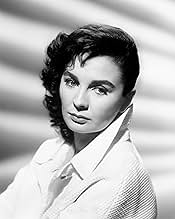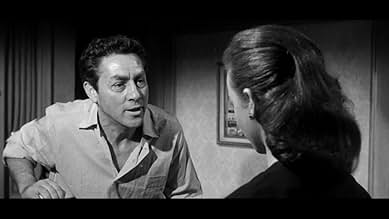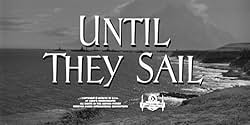IMDb RATING
6.5/10
1.8K
YOUR RATING
During WWII, unmarried New Zealand women meet and marry American soldiers who are fighting in the Pacific theater.During WWII, unmarried New Zealand women meet and marry American soldiers who are fighting in the Pacific theater.During WWII, unmarried New Zealand women meet and marry American soldiers who are fighting in the Pacific theater.
- Awards
- 1 win total
Patrick Macnee
- Pvt. Duff
- (scenes deleted)
Mary Ellen Batten
- Brunette
- (uncredited)
Nicky Blair
- US Marine
- (uncredited)
William Boyett
- US Marine
- (uncredited)
Roy Clark
- Marine at Dance
- (uncredited)
- Director
- Writers
- All cast & crew
- Production, box office & more at IMDbPro
6.51.8K
1
2
3
4
5
6
7
8
9
10
Featured reviews
Taking wanted love
A good deal made me want to see 'Until They Sail'. A fine director in Robert Wise, who directed two of my favourite films ('West Side Story' and 'The Sound of Music', is that going to be a popular opinion here?), a cast full of great actors (Paul Newman, Jean Simmons, Joan Fontaine), some interesting themes, my love for classic film and an equally interesting idea for a story.
While it was not mind-blowing or perfect, neither will it be one of my favourites any time soon, 'Until They Sail' was still a well done film with many great things, that had emotional impact, was brave in how it portrayed its themes, made the most out of its story and far from wasted its talent. Not the best work of all involved but all come off well. More one of those appreciated it rather than loved it ones.
'Until They Sail' is a little overwrought at times as could have done with a little less talk.
Also found the outcome of the Piper Laurie and Wally Cassell subplot forced and a jarring note in a film that otherwise was anything but. The odd pacing lull here and there, but a vast majority of the time the pace is measured but seldom dull.
However, there is nothing to fault the cast. Fontaine and Simmons give sensitive, deeply felt performances and Newman's is one of his better ones of his early career, comfortable and intensely cool. Piper Laurie's accent may stick out somewhat but her acting is committed and rich in emotion, while Sandra Dee is more than credible. Wise directs superbly.
Visually, 'Until They Sail' is beautifully and cleverly shot with some striking and vivid locations. The script is thought-provoking and remarkably daring in its sophistication-filled and not over-serious handling of themes seldom explored in film at this point, giving it much humanity. The story is mostly sympathetic and poignant, avoiding getting too over the top in melodrama, not easy to do with the subject and topics explored. The characters are realistically written.
In conclusion, well done and interesting, with few stumbling blocks and many great things. 7/10 Bethany Cox
While it was not mind-blowing or perfect, neither will it be one of my favourites any time soon, 'Until They Sail' was still a well done film with many great things, that had emotional impact, was brave in how it portrayed its themes, made the most out of its story and far from wasted its talent. Not the best work of all involved but all come off well. More one of those appreciated it rather than loved it ones.
'Until They Sail' is a little overwrought at times as could have done with a little less talk.
Also found the outcome of the Piper Laurie and Wally Cassell subplot forced and a jarring note in a film that otherwise was anything but. The odd pacing lull here and there, but a vast majority of the time the pace is measured but seldom dull.
However, there is nothing to fault the cast. Fontaine and Simmons give sensitive, deeply felt performances and Newman's is one of his better ones of his early career, comfortable and intensely cool. Piper Laurie's accent may stick out somewhat but her acting is committed and rich in emotion, while Sandra Dee is more than credible. Wise directs superbly.
Visually, 'Until They Sail' is beautifully and cleverly shot with some striking and vivid locations. The script is thought-provoking and remarkably daring in its sophistication-filled and not over-serious handling of themes seldom explored in film at this point, giving it much humanity. The story is mostly sympathetic and poignant, avoiding getting too over the top in melodrama, not easy to do with the subject and topics explored. The characters are realistically written.
In conclusion, well done and interesting, with few stumbling blocks and many great things. 7/10 Bethany Cox
This is what I spend the night withand no regrets . . . And nobody gets hurt.
Very good Paul Newman about the effect that war has on people's lives as they try to cope with their loneliness due to separation.
It was a great ensemble cast with Newman and Jean Simmons (Oscar nominations for The Happy Ending and Hamlet), Joan Fontaine (Oscar for Suspicion, and nominations for Rebecca and The Constant Nymph), Piper Laurie (Oscar nominations for Carrie, Children of a Lesser God, The Hustler), and Sandra Dee.
For a 1957 film, it really took on issues such as infidelity and illegitimate children and the casualness of sex during wartime.
Newman was great as the officer charged with investigating girls who soldiers wanted to marry and take back home. He played a character very familiar in his films - one that had a close relationship with the bottle.
It was a great ensemble cast with Newman and Jean Simmons (Oscar nominations for The Happy Ending and Hamlet), Joan Fontaine (Oscar for Suspicion, and nominations for Rebecca and The Constant Nymph), Piper Laurie (Oscar nominations for Carrie, Children of a Lesser God, The Hustler), and Sandra Dee.
For a 1957 film, it really took on issues such as infidelity and illegitimate children and the casualness of sex during wartime.
Newman was great as the officer charged with investigating girls who soldiers wanted to marry and take back home. He played a character very familiar in his films - one that had a close relationship with the bottle.
Great Romantic Story
This film was written by famous writer James Michener and also a very famous director Robert Wise along with a great cast of actors who made this into a great 1957 Classic to view and enjoy. The story revolves around sister's who live in New Zealand during the war and most of the men have gone into the service of their country and left a small town without any men and strictly women. As the war continues, these women seek men and when the United States troops arrive in New Zealand many women want to get married, some have babies out of wedlock and the war upsets the morals of all men and women in this small town. Jean Simmons, (Barbara Leslie Forbes); Joan Fontaine Anne Leslie and Sandra Dee, (Evelyn Leslie) are all sisters, some married and some simply living with one man after another. Sanda Dee plays the role of the baby sister in her teens who also begins to fall in love. Paul Newman, (Capt. Richard Bates) has a great interest in Barbara Leslie after her husband is killed, but he will not commit himself to her and is really afraid to start a relationship because he has to fight in the Pacific against the Japanese Government. This is a very emotional film and shows the horrors of war and the suffering it causes men and women. Enjoy.
Excellent ensemble acting with an intelligent script
War starts, the New Zealand men go off to fight, and four sisters are left to cope with that- and the arrival of the American fleet! It sounds like a recipe for the most hackneyed sort of wartime romance weepie, but this film is certainly not that.
First, this is an ensemble movie, where no one 'star' dominates. From Paul Newman (probably the best-remembered name now) on, we are given a whole clutch of accomplished and finely nuanced performances.
The cinematography is superbly judged: this is one of those lovingly observed pictures where a shot of 'two people talking' is rarely just that; the backgrounds and choice of shots are a delight. This must be viewed in the original format, not 'scanned'!
The script is intelligent and daring. Sexual topics such as promiscuity and having children outside marriage are dealt with in a surprisingly straightforward and sophisticated manner for a 1950s movie. And, it must be said, they are dealt with in a human and sympathetic fashion. There is no hint of the lurid sensationalism nor of the tight-arsed repressiveness that films of this era often display when dealing with such subject matter.
In a situation where the old well-patterned expectations have gone by the board, the sisters attempt to keep track of their universe with a wall-map of the world on which they plot where their men are now. The scope of this exercise is enlarged to include the dead, and then American 'friends'. Ultimately, the map is screwed up and thrown on the fire as the old world- including the old moral universe- goes up in smoke.
The only jarring note is the plot device allowing the film to open and close with a murder trial. One of the sisters has married a 'local'- clearly marked as unsuitable by his working class tones and chest hair! The relationship ends in worse than tears. This element of the film has all the sophistication of an Enid Blyton 'Famous Five' childrens book, and sits uneasily in such an- otherwise- intelligent performance!
First, this is an ensemble movie, where no one 'star' dominates. From Paul Newman (probably the best-remembered name now) on, we are given a whole clutch of accomplished and finely nuanced performances.
The cinematography is superbly judged: this is one of those lovingly observed pictures where a shot of 'two people talking' is rarely just that; the backgrounds and choice of shots are a delight. This must be viewed in the original format, not 'scanned'!
The script is intelligent and daring. Sexual topics such as promiscuity and having children outside marriage are dealt with in a surprisingly straightforward and sophisticated manner for a 1950s movie. And, it must be said, they are dealt with in a human and sympathetic fashion. There is no hint of the lurid sensationalism nor of the tight-arsed repressiveness that films of this era often display when dealing with such subject matter.
In a situation where the old well-patterned expectations have gone by the board, the sisters attempt to keep track of their universe with a wall-map of the world on which they plot where their men are now. The scope of this exercise is enlarged to include the dead, and then American 'friends'. Ultimately, the map is screwed up and thrown on the fire as the old world- including the old moral universe- goes up in smoke.
The only jarring note is the plot device allowing the film to open and close with a murder trial. One of the sisters has married a 'local'- clearly marked as unsuitable by his working class tones and chest hair! The relationship ends in worse than tears. This element of the film has all the sophistication of an Enid Blyton 'Famous Five' childrens book, and sits uneasily in such an- otherwise- intelligent performance!
A black and white gem
This movie is wonderful. It's romantic, truthful and perfectly cast. It shows how lonely women can be without the love of a man in their life, and how wounds take so long to heal, and how easily they can be made. Jean Simmons is beautiful and sensitive in her portrayal of a New Zealand lass trying to remain decent and understanding emotional pain and restriction in a time of war. Paul Newman is positively gorgeous and plays his role as a cynical soldier so well i could seriously believe him really being one. The ending of the movie, although somewhat predictable, is lovely and suitable. I recommend this film to all lovers of Jean Simmons, Paul Newman and the classically romantic dramas of the 50's.
Did you know
- TriviaSandra Dee's debut ("Evelyn Leslie") But, the 1957 Soviet animated feature The Snow Queen (1957) is often listed as Dee's first film credit, because she and other Hollywood stars did the voices for the English-language version, but that English-language audio was not actually made until 1959.
- GoofsAt the start of the film, set in 1939, the four sisters put up a map of the world to keep track of the soldiers' locations, but the map is contemporary from the year the film was made (1957), showing numerous nations that did not exist in 1939, for example: Laos, Cambodia and Vietnam (which would have been French Indochina in 1939), Indonesia (formerly the Dutch East Indies), Thailand (called Siam in 1939), and Pakistan (which was part of British India), among other countries.
- Quotes
Barbara Leslie Forbes: [Last lines] If my father could read the history of his daughters...
Capt. Jack Harding: He'd understand.
Barbara Leslie Forbes: As they say, to understand is to forgive. Or is it, to understand is not to forgive? I can never remember.
- ConnectionsReferences Mutiny on the Bounty (1935)
Details
Box office
- Budget
- $1,841,000 (estimated)
- Runtime
- 1h 34m(94 min)
- Color
- Sound mix
- Aspect ratio
- 2.35 : 1
Contribute to this page
Suggest an edit or add missing content






































